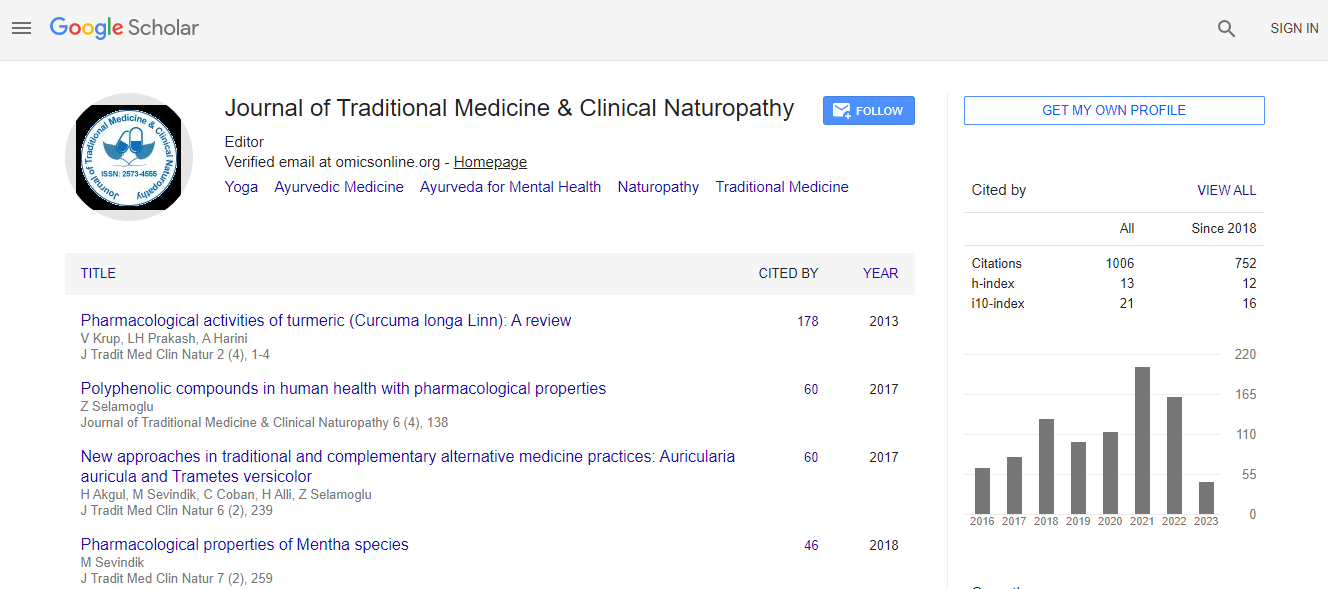Our Group organises 3000+ Global Conferenceseries Events every year across USA, Europe & Asia with support from 1000 more scientific Societies and Publishes 700+ Open Access Journals which contains over 50000 eminent personalities, reputed scientists as editorial board members.
Open Access Journals gaining more Readers and Citations
700 Journals and 15,000,000 Readers Each Journal is getting 25,000+ Readers
Google Scholar citation report
Citations : 1504
Journal of Traditional Medicine & Clinical Naturopathy peer review process verified at publons
Indexed In
- CAS Source Index (CASSI)
- Google Scholar
- Sherpa Romeo
- Open J Gate
- Genamics JournalSeek
- RefSeek
- Directory of Research Journal Indexing (DRJI)
- Hamdard University
- EBSCO A-Z
- Publons
- Geneva Foundation for Medical Education and Research
- Euro Pub
- ICMJE
Useful Links
Recommended Journals
Related Subjects
Share This Page
Effects of acupuncture on serum metabolic parameters in premenopausal obese women
Joint Event on Global Summit on Traditional & Restorative Medicine & 10th World Congress on Neuropharmacology
Mi-Yeon Song, Woo-Chul Shin,Jae-Heung Cho, Koh-Woon Kim and Hi-Joon Park
Kyung Hee University, Republic of Korea
ScientificTracks Abstracts: J Tradit Med Clin Natur
Abstract
Recently, World health organization (WHO) global estimated that at least 1.9 billion adults were overweight, and among them, over 650 million adults were obese. Despite its increasing importance in public health, obesity management is still difficult, when obesity is associated with various metabolic problems. Nowadays, acupuncture is increasingly used to treat obesity, but numerous evidences of clinical trials are not fully convincing because of the poor methodological quality, inadequate controls, limited parameters and complex etiologies of obesity interacting with various metabolites. The aim of this study was to verify the effect of acupuncture on the obese related parameters in aspects of metabolomics. Two-arm parallel, patient-assessor blinded, non-penetrating sham-controlled randomized clinical trial was conducted on 120 subjects. Eligible participants, women (19 years of age or older), clinically diagnosed as obesity (body mass index of 25 kg/m2 or more) were randomly allocated into real acupuncture treatment group (manual acupuncture plus electroacupuncture, n=60) or sham acupuncture control group (sham acupuncture plus placebo electroacupuncture without electrical stimulation, n=60) and received treatment two times a week for six weeks. Serum metabolic profile including triglyceride (TG), high density lipoprotein cholesterol (HDL), low density lipoprotein cholesterol (LDL), phospholipids, fatty acids, and carnitine group were analyzed. Body weight, body fat mass, muscle mass, waist circumference, and hip circumference were also measured. After 12 sessions of treatment, both groups showed significant improvement in body measurement. However, there were no significant differences between two groups in body measurement. In acupuncture treatment group, short and middle-chain acylcarnitine including C2, C4, and C6 and L-carnitine had increased, compared to sham-acupuncture group. Although body measurement showed no differences between two treatment groups, increase in specific carnitine group could mean beneficial effect of acupuncture in obese population.Biography
Mi-Yeon Song has completed her PhD from Kyung Hee University. She is a Post-doctoral Research Fellow from Columbia University College of Physicians and Surgeons. She is now a Professor of Kyung Hee University College of Korean Medicine. She has published more than 25 papers in reputed journals and has been serving as an Editorial Board Member of the “Journal of Korean Medicine Rehabilitation”.
E-mail: mysong@khu.ac.kr

 Spanish
Spanish  Chinese
Chinese  Russian
Russian  German
German  French
French  Japanese
Japanese  Portuguese
Portuguese  Hindi
Hindi 
